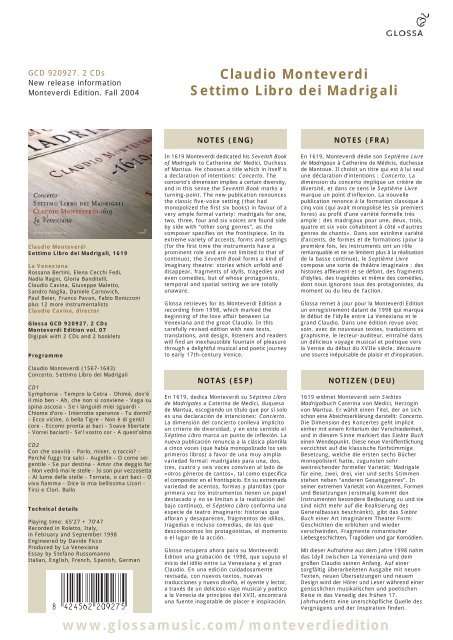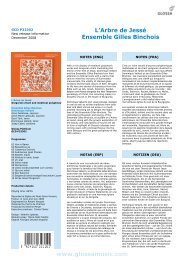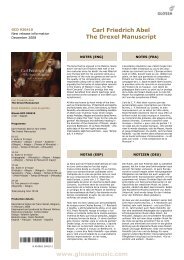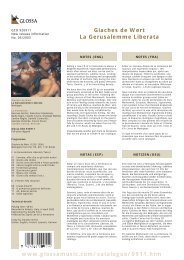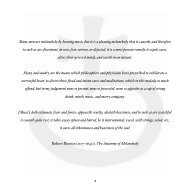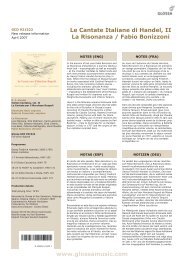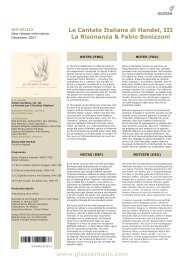Claudio Monteverdi Settimo Libro dei Madrigali - Glossa Music
Claudio Monteverdi Settimo Libro dei Madrigali - Glossa Music
Claudio Monteverdi Settimo Libro dei Madrigali - Glossa Music
Create successful ePaper yourself
Turn your PDF publications into a flip-book with our unique Google optimized e-Paper software.
GCD 920927. 2 CDs<br />
New release information<br />
<strong>Monteverdi</strong> Edition. Fall 2004<br />
<strong>Claudio</strong> <strong>Monteverdi</strong><br />
<strong>Settimo</strong> <strong>Libro</strong> <strong>dei</strong> <strong>Madrigali</strong>, 1619<br />
La Venexiana<br />
Rossana Bertini, Elena Cecchi Fedi,<br />
Nadia Ragni, Gloria Banditelli,<br />
<strong>Claudio</strong> Cavina, Giuseppe Maletto,<br />
Sandro Naglia, Daniele Carnovich,<br />
Paul Beier, Franco Pavan, Fabio Bonizzoni<br />
plus 12 more instrumentalists<br />
<strong>Claudio</strong> Cavina, director<br />
<strong>Glossa</strong> GCD 920927. 2 CDs<br />
<strong>Monteverdi</strong> Edition vol. 07<br />
Digipak with 2 CDs and 2 booklets<br />
Programme<br />
<strong>Claudio</strong> <strong>Monteverdi</strong> (1567-1643)<br />
Concerto. <strong>Settimo</strong> <strong>Libro</strong> <strong>dei</strong> <strong>Madrigali</strong><br />
CD1<br />
Symphonia - Tempro la Cetra - Ohimè, dov’è<br />
il mio ben - Ah, che non si conviene - Vaga su<br />
spina ascosa - Se i languidi miei sguardi -<br />
Chiome d’oro - Interrotte speranze - Tu dormi?<br />
- Ecco vicine, o bella Tigre - Non è di gentil<br />
core - Eccomi pronta ai baci - Soave libertate<br />
- Vorrei baciarti - Se’l vostro cor - A quest’olmo<br />
CD2<br />
Con che soavità - Parlo, miser, o taccio? -<br />
Perché fuggi tra salci - Augellin - O come sei<br />
gentile - Se pur destina - Amor che deggio far<br />
- Non vedrò mai le stelle - Io son pur vezzosetta<br />
- Al lume delle stelle - Tornate, o cari baci - O<br />
viva fiamma - Dice la mia bellissima Licori -<br />
Tirsi e Clori. Ballo<br />
Technical details<br />
Playing time: 65’27 + 70’47<br />
Recorded in Roletto, Italy,<br />
in February and September 1998<br />
Engineered by Davide Ficco<br />
Produced by La Venexiana<br />
Essay by Stefano Russomanno<br />
Italian, English, French, Spanish, German<br />
<strong>Claudio</strong> <strong>Monteverdi</strong><br />
<strong>Settimo</strong> <strong>Libro</strong> <strong>dei</strong> <strong>Madrigali</strong><br />
NOTES (ENG)<br />
In 1619 <strong>Monteverdi</strong> dedicated his Seventh Book<br />
of Madrigals to Catherine de’ Medici, Duchess<br />
of Mantua. He chooses a title which in itself is<br />
a declaration of intentions: Concerto. The<br />
concerto’s dimension implies a certain diversity,<br />
and in this sense the Seventh Book marks a<br />
turning-point. The new publication renounces<br />
the classic five-voice setting (that had<br />
monopolized the first six books) in favour of a<br />
very ample formal variety: madrigals for one,<br />
two, three, four and six voices are found side<br />
by side with “other song genres”, as the<br />
composer specifies on the frontispiece. In its<br />
extreme variety of accents, forms and settings<br />
(for the first time the instruments have a<br />
prominent role and are not limited to that of<br />
continuo), the Seventh Book forms a kind of<br />
imaginary theatre: stories which unfold and<br />
disappear, fragments of idylls, tragedies and<br />
even comedies, but of whose protagonists,<br />
temporal and spatial setting we are totally<br />
unaware.<br />
<strong>Glossa</strong> retrieves for its <strong>Monteverdi</strong> Edition a<br />
recording from 1998, which marked the<br />
beginning of the love affair between La<br />
Venexiana and the great <strong>Claudio</strong>. In this<br />
carefully revised edition with new texts,<br />
translations, and design, listeners and readers<br />
will find an inexhaustible fountain of pleasure<br />
through a delightful musical and poetic journey<br />
to early 17th-century Venice.<br />
NOTAS (ESP)<br />
En 1619, dedica <strong>Monteverdi</strong> su Séptimo <strong>Libro</strong><br />
de Madrigales a Caterina de Medici, duquesa<br />
de Mantua, escogiendo un título que por sí solo<br />
es una declaración de intenciones: Concierto.<br />
La dimensión del concierto conlleva implícito<br />
un criterio de diversidad, y en este sentido el<br />
Séptimo <strong>Libro</strong> marca un punto de inflexión. La<br />
nueva publicación renuncia a la clásica plantilla<br />
a cinco voces (que había monopolizado los seis<br />
primeros libros) a favor de una muy amplia<br />
variedad formal: madrigales para una, dos,<br />
tres, cuatro y seis voces conviven al lado de<br />
«otros géneros de cantos», tal como especifica<br />
el compositor en el frontispicio. En su extremada<br />
variedad de acentos, formas y plantillas (por<br />
primera vez los instrumentos tienen un papel<br />
destacado y no se limitan a la realización del<br />
bajo continuo), el Séptimo <strong>Libro</strong> conforma una<br />
especie de teatro imaginario: historias que<br />
afloran y desaparecen, fragmentos de idilios,<br />
tragedias e incluso comedias, de los que<br />
desconocemos los protagonistas, el momento<br />
o el lugar de la acción.<br />
<strong>Glossa</strong> recupera ahora para su <strong>Monteverdi</strong><br />
Edition una grabación de 1998, que supuso el<br />
inicio del idilio entre La Venexiana y el gran<br />
<strong>Claudio</strong>. En una edición cuidadosamente<br />
revisada, con nuevos textos, nuevas<br />
traducciones y nuevo diseño, el oyente y lector,<br />
a través de un delicioso viaje musical y poético<br />
a la Venecia de principios del XVII, encontrará<br />
una fuente inagotable de placer e inspiración.<br />
NOTES (FRA)<br />
En 1619, <strong>Monteverdi</strong> dédie son Septième Livre<br />
de Madrigaux à Catherine de Médicis, duchesse<br />
de Mantoue. Il choisit un titre qui est à lui seul<br />
une déclaration d’intentions : Concerto. La<br />
dimension du concerto implique un critère de<br />
diversité, et dans ce sens le Septième Livre<br />
marque un point d’inflexion. La nouvelle<br />
publication renonce à la formation classique à<br />
cinq voix (qui avait monopolisé les six premiers<br />
livres) au profit d’une variété formelle très<br />
ample : des madrigaux pour une, deux, trois,<br />
quatre et six voix cohabitent à côté «d’autres<br />
genres de chants». Dans son extrême variété<br />
d’accents, de formes et de formations (pour la<br />
première fois, les instruments ont un rôle<br />
remarquable et ne se limitent plus à la réalisation<br />
de la basse continue), le Septième Livre<br />
compose une sorte de théâtre imaginaire : des<br />
histoires affleurent et se défont, des fragments<br />
d’idylles, des tragédies et même des comédies,<br />
dont nous ignorons tous des protagonistes, du<br />
moment ou du lieu de l’action.<br />
<strong>Glossa</strong> remet à jour pour la <strong>Monteverdi</strong> Edition<br />
un enregistrement datant de 1998 qui marqua<br />
le début de l’idylle entre La Venexiana et le<br />
grand <strong>Claudio</strong>. Dans une édition revue avec<br />
soin, avec de nouveaux textes, traductions et<br />
graphisme, le lecteur-auditeur, entraîné dans<br />
un délicieux voyage musical et poétique vers<br />
la Venise du début du XVIIe siècle, découvre<br />
une source inépuisable de plaisir et d’inspiration.<br />
NOTIZEN (DEU)<br />
1619 widmet <strong>Monteverdi</strong> sein Siebtes<br />
Madrigalbuch Caterina von Medici, Herzogin<br />
von Mantua. Er wählt einen Titel, der an sich<br />
schon eine Absichtserklärung darstellt: Concerto.<br />
Die Dimension des Konzertes geht implizit<br />
einher mit einem Kriterium der Verschiedenheit,<br />
und in diesem Sinne markiert das Siebte Buch<br />
einen Wendepunkt. Diese neue Veröffentlichung<br />
verzichtet auf die klassische fünfstimmige<br />
Besetzung, welche die ersten sechs Bücher<br />
monopolisiert hatte, zugunsten sehr<br />
weitreichender formeller Varietät: Madrigale<br />
für eine, zwei, drei, vier und sechs Stimmen<br />
stehen neben “anderen Gesanggenres”. In<br />
seiner extremen Varietät von Akzenten, Formen<br />
und Besetzungen (erstmalig kommt den<br />
Instrumenten besondere Bedeutung zu und sie<br />
sind nicht mehr auf die Realisierung des<br />
Generalbasses beschränkt), gibt das Siebte<br />
Buch einer Art imaginärem Theater Form:<br />
Geschichten die erblühen und wieder<br />
verschwinden, Fragmente romantischer<br />
Liebesgeschichten, Tragödien und gar Komödien.<br />
Mit dieser Aufnahme aus dem Jahre 1998 nahm<br />
das Idyll zwischen La Venexiana und dem<br />
großen <strong>Claudio</strong> seinen Anfang. Auf einer<br />
sorgfältig überarbeiteten Ausgabe mit neuen<br />
Texten, neuen Übersetzungen und neuem<br />
Design wird der Hörer und Leser während einer<br />
genüsslichen musikalischen und poetischen<br />
Reise in das Venedig des frühen 17.<br />
Jahrhunderts eine unerschöpfliche Quelle des<br />
Vergnügens und der Inspiration finden.<br />
www.glossamusic.com/monteverdiedition
Other CDs by La Venexiana (selection):<br />
<strong>Claudio</strong> <strong>Monteverdi</strong><br />
Secondo <strong>Libro</strong> <strong>dei</strong> <strong>Madrigali</strong>, 1590<br />
GCD 920922. <strong>Monteverdi</strong> Edition 02<br />
<strong>Claudio</strong> <strong>Monteverdi</strong><br />
<strong>Settimo</strong> <strong>Libro</strong> <strong>dei</strong> <strong>Madrigali</strong>, 1619<br />
GCD 920927. 2 CDs. <strong>Monteverdi</strong> Edition 07<br />
Fall 2004<br />
<strong>Monteverdi</strong> live !<br />
A selection of madrigals by <strong>Claudio</strong> <strong>Monteverdi</strong><br />
GCD P30912<br />
Giaches de Wert<br />
La Gerusalemme Liberata (<strong>Madrigali</strong>)<br />
GCD 920911<br />
Gesualdo da Venosa<br />
Il Quarto <strong>Libro</strong> di <strong>Madrigali</strong>, 1596<br />
GCD 920907<br />
Luca Marenzio<br />
Il Nono <strong>Libro</strong> di <strong>Madrigali</strong>, 1599<br />
GCD 920906<br />
Sigismondo d’India<br />
<strong>Libro</strong> Primo de <strong>Madrigali</strong>,1606<br />
GCD 920908<br />
Luzzasco Luzzaschi<br />
Quinto <strong>Libro</strong> de’ <strong>Madrigali</strong>, 1595<br />
GCD 920905<br />
Forthcoming CDs by La Venexiana:<br />
Gesualdo da Venosa<br />
Il Quinto <strong>Libro</strong> di <strong>Madrigali</strong><br />
GCD 920913<br />
Winter/Spring 2005<br />
<strong>Claudio</strong> <strong>Monteverdi</strong><br />
Sesto <strong>Libro</strong> <strong>dei</strong> <strong>Madrigali</strong><br />
GCD 920926. <strong>Monteverdi</strong> Edition 06<br />
Spring 2005<br />
La Venexiana<br />
<strong>Claudio</strong> Cavina<br />
ABOUT THE ARTIST<br />
The name “La Venexiana” is taken from an<br />
anonymous Renaissance comedy, one of the<br />
cardinal points of reference in Italian theatre<br />
both for its use of language, a combination of<br />
Italian and dialect, and for its acute rendering<br />
of a society and its manners. In styling itself<br />
after this glorious tradition, La Venexiana aims<br />
to incorporate into its musical interpretations<br />
an attention to language in all of its subtlety,<br />
and an exultation of contrasts between the<br />
refined and the popular, the sacred and the<br />
profane. This ensemble has established a new<br />
style in Italian early music performance: a<br />
warm, truly Mediterranean blend of textual<br />
declamation, rhetorical colour and harmonic<br />
refinement. Born of the collaboration between<br />
soprano Rossana Bertini and countertenor<br />
<strong>Claudio</strong> Cavina, its current musical director, La<br />
Venexiana makes a careful use of the original<br />
sources, keeping the activity of the ensemble<br />
always stimulating and full of enjoyable<br />
surprises.<br />
Since 1998, La Venexiana records exclusively<br />
for <strong>Glossa</strong>. After 6 years with our label and 12<br />
CDs, the musical press has demonstrated its<br />
unanimity in considering La Venexiana the<br />
greatest specialists in the area of the Italian<br />
madrigal. This opinion is also reflected by the<br />
steady flow of international prizes the group is<br />
receiving, among which stand out the<br />
Gramophone Award and the Cannes Classical<br />
Award.<br />
ACERCA DEL ARTISTA<br />
El nombre «La Venexiana» está tomado de una<br />
comedia renacentista anónima, uno de los<br />
puntos de referencia cruciales en el teatro<br />
italiano, tanto por su uso del lenguaje, una<br />
combinación de italiano y dialecto, como por<br />
su fiel reflejo de una sociedad y sus costumbres.<br />
Inspirándose en esta gloriosa tradición, La<br />
Venexiana incorpora a sus interpretaciones<br />
musicales un exquisito tratamiento del lenguaje,<br />
intentando captar todas sus sutilezas y expresar<br />
los contrastes entre lo refinado y lo popular, lo<br />
sacro y lo profano. Este conjunto ha establecido<br />
un nuevo estilo en la interpretación de la música<br />
antigua italiana: una cálida y profundamente<br />
mediterránea combinación de declamación de<br />
los textos, color retórico y refinamiento<br />
armónico. Nacido de la colaboración entre la<br />
soprano Rossana Bertini y el contratenor <strong>Claudio</strong><br />
Cavina, su actual director musical, el conjunto<br />
La Venexiana hace un cuidadoso uso de las<br />
fuentes originales, manteniendo siempre la<br />
actividad del grupo llena de estimulantes<br />
sorpresas.<br />
Desde 1998, La Venexiana graba en exclusiva<br />
para <strong>Glossa</strong>. Tras 6 años en nuestro sello y 12<br />
CDs, la crítica musical se muestra unánime al<br />
considerar a La Venexiana como los máximos<br />
especialistas en el madrigal italiano. Este hecho<br />
se refleja también en el incesante flujo de<br />
premios internacionales que el grupo está<br />
obteniendo, entre los que destacan el premio<br />
Gramophone y el Cannes Classical Award.<br />
À PROPOS DE L’ARTISTE<br />
Le nom de «La Venexiana» provient d’une<br />
comédie anonyme de la Renaissance, qui est<br />
l’une des références cruciales du théâtre italien,<br />
aussi bien pour l’utilisation de la langue –une<br />
combinaison d’italien et de dialecte– que pour<br />
la représentation fidèle d’une société et de ses<br />
coutumes. S’inspirant de cette glorieuse<br />
tradition, La Venexiana incorpore à son<br />
interprétation un traitement exquis du langage<br />
en tentant de capter toute sa subtilité et<br />
d’exprimer les contrastes entre le monde érudit<br />
et populaire, entre le sacré et le profane. Cet<br />
ensemble a établi un nouveau style<br />
d’interprétation de la musique ancienne<br />
italienne: une fusion chaude, profondément<br />
méditerranéenne, de l’art de la déclamation<br />
des textes, de la couleur rhétorique et du<br />
raffinement harmonique.<br />
La Venexiana enregistre en exclusivité chez<br />
<strong>Glossa</strong> depuis 1998. Après une collaboration<br />
de 6 ans et 12 CDs réalisés par notre maison<br />
discographique, la critique musicale est unanime<br />
à considérer La Venexiana comme le plus grand<br />
spécialiste du madrigal italien. Cette situation<br />
se reflète aussi dans l’incessante moisson de<br />
prix internationaux, entre lesquels brillent d’un<br />
éclat particulier le Prix Gramophone et le Cannes<br />
Classical Award.<br />
ZUM KÜNSTLER<br />
Der Name »La Venexiana« ist einer anonymen<br />
Renaissancekomödie entnommen, einer<br />
Gattung, die mit ihrer Sprache, eine Verbindung<br />
von Italienisch und Dialekten, und als<br />
authentisches Spiegelbild einer Gesellschaft<br />
und ihrer Gewohnheiten, einen wesentlichen<br />
Referenzpunkt innerhalb des italienischen<br />
Theaters ausmacht. Von dieser glorreichen<br />
Tradition inspiriert ist in den Interpretationen<br />
von La Venexiana eine äußerst feinfühlige<br />
Behandlung der Sprache verkörpert, und so<br />
strebt das Ensemble an, alle Nuancen zu<br />
erfassen und die Kontraste zwischen Gehobenem<br />
und Volkstümlichem oder zwischen Geistlichem<br />
und Weltlichem zum Ausdruck zu bringen. La<br />
Venexiana hat Schule gemacht und einen neuen<br />
Stil geschaffen, was die Interpretation alter<br />
italienischer Musik betrifft: eine gefühlvolle und<br />
zutiefst mediterrane Verbindung von Textvortrag,<br />
rhetorischer Farbgebung und harmonischen<br />
Feinheiten.<br />
Seit 1998 nimmt La Venexiana ausschließlich<br />
bei <strong>Glossa</strong> auf. Nach 6 Jahren und 12<br />
veröffentlichten CDs ist sich die Musikkritik<br />
einig, dass La Venexiana das herausragende<br />
Ensemble ist, was das italienische Madrigal<br />
betrifft. Dies spiegelt sich auch wider in den<br />
zahlreichen internationalen Preisen, mit denen<br />
das Ensemble ein ums andere Mal ausgezeichnet<br />
wird. Hervorzuheben sind insbesondere der<br />
Gramophone Award und der Cannes<br />
Classical Award.<br />
www.glossamusic.com/monteverdiedition


